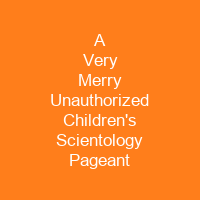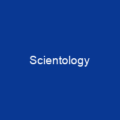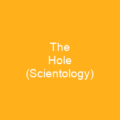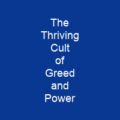A Very Merry Unauthorized Children’s Scientology Pageant is a satirical musical about Scientology and L. Ron Hubbard. The musical follows the life of Hubbard as he develops Dianetics and then Scientology. Topics explored in the piece include Dianetics, the E-meter, Thetans, and the story of Xenu.
About A Very Merry Unauthorized Children’s Scientology Pageant in brief

It has been called a “deadpan presentation” of Hubbard’s life story, though the musical pokes fun at Hubbard’s science fiction writing and personal beliefs. It also drew on the awkward woodenness of Christmas pageants — the fact that children are often made to say large words that don’t sound natural coming out of their mouths. The script for the play is published bySamuel French,. Inc. Jarrow was motivated to write the script by what he saw as a shift in religious teachings – from an old model involving hell and retribution, to a new system of thought promising money or peace. He said Scientology would be an especially interesting topic for a theater piece because of its criticism of psychiatry, relative newness compared to Buddhism, Islam, Judaism, and Christianity, and practice of requiring courses which cost significant amounts of money. Jarrow’s script was almost entirely based on Hubbard’s own writings and the church’s literature, though he was also influenced by critical journalistic accounts. He wanted to have an honest conversation with people who just want to parrot behavior and just have a conversation with them. He also wanted to let the Church speak for itself. During production, the creative team worked with cast members to educate them about the play’s background. It was written by Kyle Jarrow and Alex Timbers, and Timbers and Jarrow wrote the accompanying book, music, and lyrics. It is based on a concept by Timbers, the show’s original director.
You want to know more about A Very Merry Unauthorized Children’s Scientology Pageant?
This page is based on the article A Very Merry Unauthorized Children’s Scientology Pageant published in Wikipedia (as of Dec. 04, 2020) and was automatically summarized using artificial intelligence.







